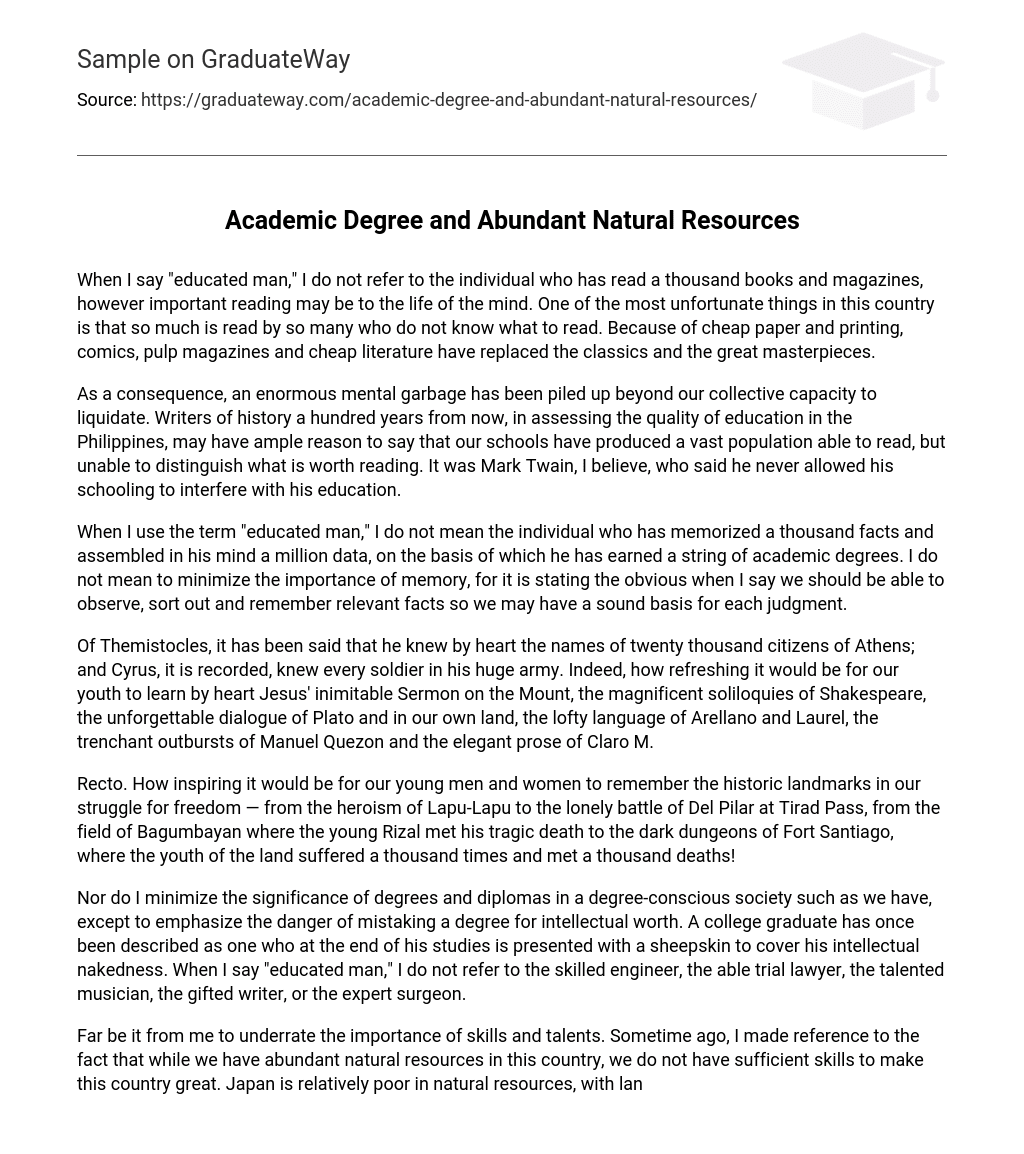When I mention an “educated man,” I am not referring to someone who has simply read countless books and magazines, although reading is undeniably significant for intellectual development. It is regrettable that in this country, many individuals read a great deal without knowing what they should actually be reading. Due to the availability of low-cost paper and printing, comics, pulp magazines, and inexpensive literature have supplanted the classics and the incredible works of art.
Due to this, there is an overwhelming amount of mental waste that has accumulated and is beyond our ability to eliminate. In the future, historians examining the state of education in the Philippines may find ample evidence to conclude that our schools have produced a large population capable of reading, but lacking the ability to discern valuable material. Mark Twain once remarked that he never allowed his formal education to hinder his true education.
When I refer to an “educated man,” I am not referring to someone who has simply memorized facts and obtained numerous academic degrees. I don’t intend to downplay the significance of memory, as it is essential to observe, organize, and recall pertinent information in order to make sound judgments.
It has been said that Themistocles knew the names of twenty thousand citizens of Athens by heart, while Cyrus knew every soldier in his massive army. Imagine how revitalizing it would be for our youth to commit to memory Jesus’ unparalleled Sermon on the Mount, Shakespeare’s magnificent soliloquies, Plato’s unforgettable dialogues, and in our own country, the lofty language of Arellano and Laurel, the trenchant outbursts of Manuel Quezon, and the elegant prose of Claro M.
Recto. It would be so motivating for our youth to commemorate the important sites that played a role in our fight for freedom — from Lapu-Lapu’s heroism to Del Pilar’s solitary battle at Tirad Pass, from the field of Bagumbayan where Rizal tragically died to the oppressive cells of Fort Santiago, where the young generation experienced countless hardships and faced death repeatedly!
I acknowledge the importance of degrees and diplomas in a society where they hold high value. However, it is crucial to not mistake a degree as the sole indicator of intellectual worth. A college graduate has been humorously described as someone who receives a diploma to cover up their lack of intellectual depth. When I mention an “educated man,” I am not referring to professionals such as engineers, lawyers, musicians, writers, or surgeons who possess great skill and talent.
While I acknowledge the significance of skills and talents, I cannot diminish their importance. I previously mentioned that although our country possesses plentiful natural resources, we lack the necessary skills to elevate it. On the contrary, Japan, with its limited land and overwhelming population, is deficient in natural resources yet has managed to rebound vigorously after a devastating war. This is primarily due to its highly skilled population.
However, I propose that becoming a great scientist, an able lawyer, or a noted writer is only possible if one is first and foremost a good person. Using abundant talent for evil purposes is a misuse of divine gifts. So, what defines an educated person? Is it someone who has read extensively? Partially, yes, as long as their reading material is meaningful, selective, and inspiring. Is it someone who can recall numerous facts and events?
Yes, the training of memory is a vital discipline that requires effort and application. Additionally, a sound judgment cannot be made without respect for remembered facts. One could argue that an educated person is someone who possesses skills to provide for themselves and their family. Education should teach us how to make a living, but we must always remember that a living of life is far more important. This entails leading a good life, a meaningful life, and an abundant life.
The educated person embraces a certain lifestyle by opening their mind to profound thoughts and uplifting concepts. They escape the confinement of mere words on a page and instead opt for a persistent, meticulous examination and appraisal of all literature. Their focus lies not on obtaining multiple degrees, but rather on invigorating their intellect and nurturing a compassionate character.
The text highlights the qualities that make a person worthy. These qualities include a focus on discerning and defending what is right, clear and logical expression, humility in recognizing one’s imperfections, reverence for the worth of every human being, a sense of values, a broad perspective, and compassion cultivated through education. Additionally, the text emphasizes the readiness to sacrifice oneself for good government and living a relevant life by actively engaging with the problems of the time and approaching them with intelligence, fairness, and understanding.





